Iraqi Foreign Minister heads to the United States on an official visit
Iraqi Foreign Minister heads to the United States on an official visit
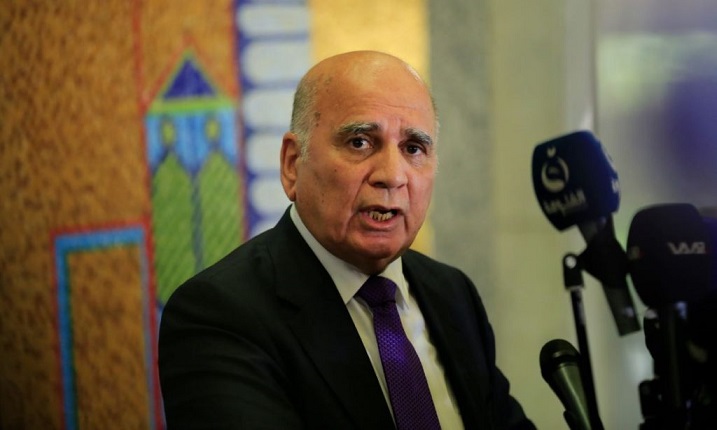 Iraqi Foreign Minister Fuad Hussein departed for the United States on Thursday on an official visit to discuss several joint security and economic issues.
Iraqi Foreign Minister Fuad Hussein departed for the United States on Thursday on an official visit to discuss several joint security and economic issues.
Fuad Hussein said in a post on Twitter: “We left Thursday, for the United States, where we will hold a series of bilateral meetings to strengthen Iraqi-American relations and coordinate efforts on regional and international issues.” He stressed that “we will discuss ways to enhance joint security and cooperation in various fields.”
For his part, an informed Iraqi government source confirmed that “Hussein will discuss several important issues with the American side, with the political and security aspects dominating these issues.” The source, who requested anonymity, said that “the discussions, which will be initiated by Foreign Minister Fuad Hussein and an accompanying government delegation, will include the American presence in Iraq and the mission of the international coalition, and security cooperation understandings regarding the fight against ISIS, in addition to financial and economic issues, most notably the possibility of signing a joint memorandum of cooperation between the two sides regarding energy supplies with General Electric and reforming the Iraqi gas sector to achieve self-sufficiency.”
He explained that “the minister will discuss with the American side the possibility of extending the import of Iranian gas for a further period, to avoid the energy crisis that Iraq may experience next summer.”
Burathanews.com
Trump receives recommendation to extend US forces in Iraq until 2029
Trump receives recommendation to extend US forces in Iraq until 2029
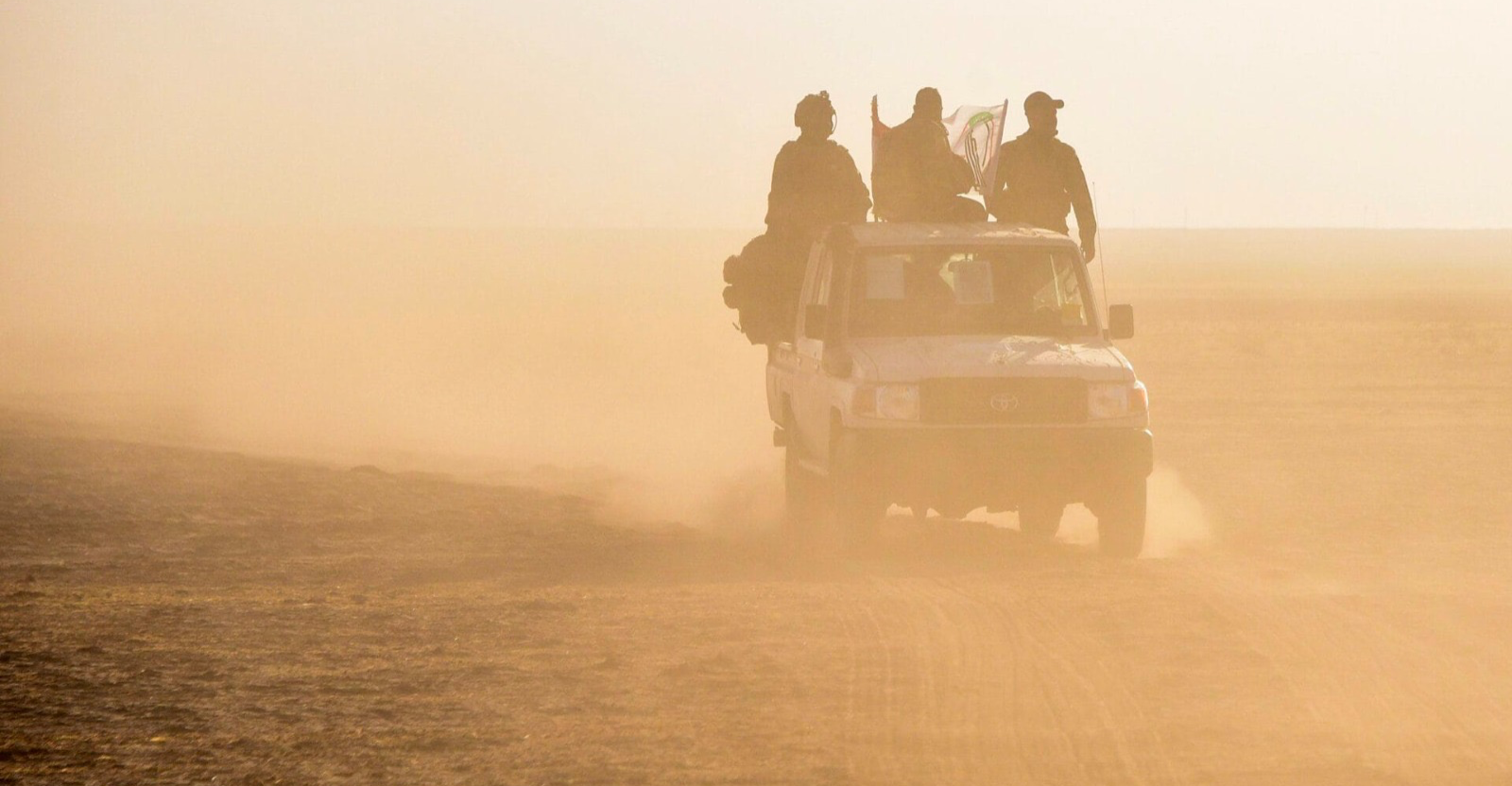 Trump receives recommendation to extend US forces in Iraq until 2029Shafaq News/ The New Line Institute, an American think tank specializing in political and military affairs, recommended that the Trump administration extend the presence of US forces in Iraq until 2029, warning of the danger of a sudden withdrawal to the capabilities of Iraqi security forces and efforts to combat ISIS.
Trump receives recommendation to extend US forces in Iraq until 2029Shafaq News/ The New Line Institute, an American think tank specializing in political and military affairs, recommended that the Trump administration extend the presence of US forces in Iraq until 2029, warning of the danger of a sudden withdrawal to the capabilities of Iraqi security forces and efforts to combat ISIS.
The website stated in a report translated by Shafaq News Agency, “Following a sharp regional escalation that severed ties with Iran and its proxies in the Middle East, the United States finds itself in a new strategic position in Iraq and Syria, where Iranian influence and capabilities have suffered a severe blow. With the rapid and sudden departure of the Assad regime, allied with Tehran, and the retreat of the Islamic Revolutionary Guard Corps units and forces loyal to it during Israeli strikes, new opportunities loom for American interests in the region.”
The report added, “With Iran’s grip on Damascus and Baghdad weakening—as evidenced by a sharp decline in Iranian and Iranian-backed militia strikes on US assets and partners—the United States and its partners in the Global Coalition to Defeat ISIS face fewer distractions and more room to improve the capabilities of their local partners.”
ISIS is lurking in Iraq
The report indicated that “ISIS fighters have increased their momentum in the Syrian desert in preparation for a return across the border into Iraq, a concern that has prompted the Iraqi federal government to sound the alarm and seek a long-term security partnership with the United States.” It explained that “Baghdad has already expressed initial interest in extending the US timetable for military withdrawal from Iraq, adding three years to the already vague withdrawal plan to hedge against Iran and sudden instability.”
He continued: “The United States has long viewed the rapid timetable for withdrawal from Iraq as an opportunity for Iran, ISIS, and other malign regional actors, jeopardizing regional stability and human security. Washington also has a difficult history with hasty withdrawals from counterterrorism missions.”
He noted that “decision-makers are still haunted by memories of the failed withdrawal from Afghanistan in 2021, in addition to the fact that just three years after US forces concluded their combat mission and withdrew from Iraq, they found themselves returning to the country to fight a new terrorist organization that exploited the vacuum left by US forces.”
He explained that “the second Trump administration represents the beginning of an ambiguous chapter for the American forward presence in the Levant. The new administration has repeatedly expressed its desire to transfer responsibility for regional security in the Middle East to its partner, Israel, and to carry out an immediate military withdrawal. Given its skepticism about the usefulness of a small American forward presence in Iraq and Syria for Washington’s interests, it is likely that President Donald Trump will authorize a rapid withdrawal of American forces from Iraq and Syria.”
The report stressed that “policymakers in Washington and their partners abroad must assess the scenarios that will unfold following the US withdrawal, including how civilian and military missions outside the international coalition, such as the NATO mission in Iraq, will be able to survive on their own, how local forces such as the Iraqi Security Forces and the Syrian Democratic Forces will be able to repel threats from ISIS and pro-Iranian militias without US assistance, and how external actors may seek regional competition or political influence in place of a long-term US presence and partnership.”
Recommendations to stay
The report recommended that Washington seek to “diversify its security influence in Iraq beyond its military presence and capacity-building efforts with Iraqi military forces, and seek to revive cooperation in law enforcement, counternarcotics efforts, border security initiatives, and other areas of coordination.” It noted that “facing a potential US withdrawal from Iraq and Syria or an extension of the withdrawal schedule until 2029, NATO and the European Union should coordinate with Iraqi security forces to develop a strategy for their future presence in Iraq and identify gaps that their missions can fill as the fight against ISIS draws to a close.”
He noted that “with the possibility of withdrawal, the United States should seek greater coordination with other military and civilian capacity-building missions, such as the NATO mission in Iraq and the European Union civilian mission in Iraq, as a sudden US military withdrawal would make these operations vulnerable without careful planning.” He explained that “NATO and the European Union should engage in multilateral discussions with the US government, the Iraqi government, and the Kurdistan Regional Government to develop a strategy for their presence in Iraq in the wake of a potential US withdrawal.”
The US report concluded that, “With ISIS attacks and activity increasing since the fall of President Bashar al-Assad’s regime in December 2024, the United States should encourage the Kurdistan Regional Government and the Iraqi federal government to cooperate with the new Syrian administration and the Hashemite Kingdom of Jordan to increase cooperation on counterterrorism, intelligence, and security, in anticipation of the possibility of ISIS infiltration from the Syrian desert into Iraq and possibly Jordan.”
Shafaq.com
Iraq to be the third largest Arab exporter of goods in 2024
Iraq to be the third largest Arab exporter of goods in 2024
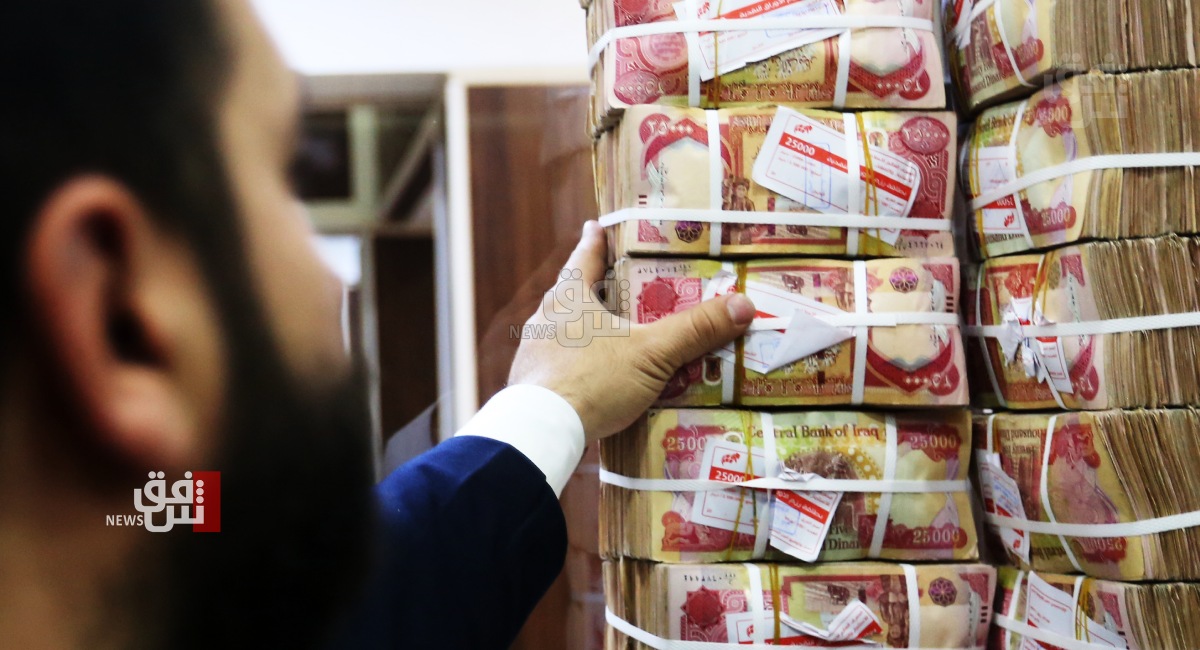 he World Trade Organization announced on Thursday that Iraq ranked third as the largest exporter of goods in 2024.
he World Trade Organization announced on Thursday that Iraq ranked third as the largest exporter of goods in 2024.
The organization said in a report seen by Shafaq News Agency that Iraq ranked third among Arab countries as the largest exporter of goods, with exports valued at $102 billion, a 3% change from last year, representing 0.5% of global exports.
The organization added that the UAE ranked first in the Arab world in commodity exports in 2024, exporting $603 billion, followed by Saudi Arabia in second place with exports amounting to $503 billion, followed by Qatar in fourth place with exports amounting to $94 billion, followed by Kuwait with exports amounting to $76 billion.
The organization added that Oman came in sixth place with exports amounting to $63 billion, Algeria came in seventh with exports amounting to $50 billion, Morocco came in eighth with $45 billion, Egypt came in ninth with $42 billion, and Libya came in tenth with exports amounting to $30 billion.
Shafaq.com
Avoiding billions of dollars in losses, Iraq wins dozens of international lawsuits.
Avoiding billions of dollars in losses, Iraq wins dozens of international lawsuits.
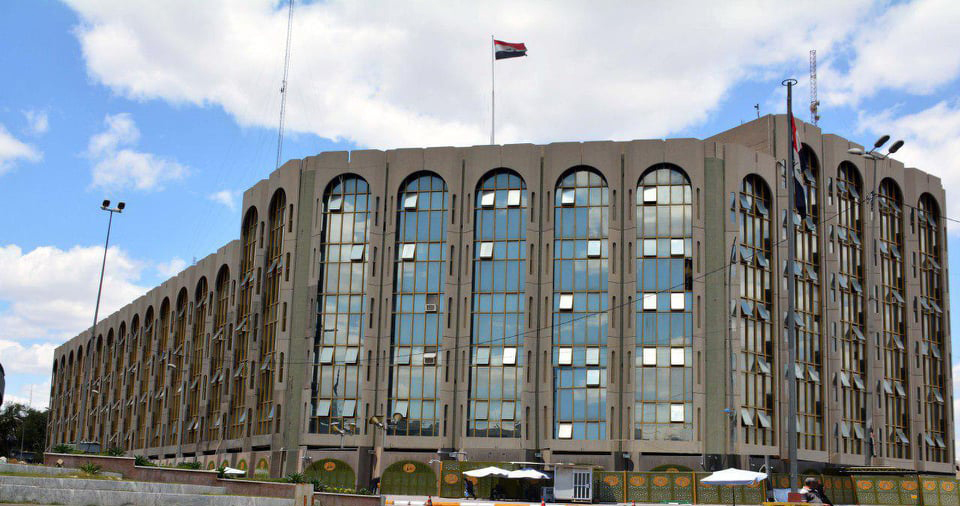 The Iraqi Ministry of Justice announced on Thursday that it had won 36 international lawsuits in favor of Iraq without incurring any losses, avoiding paying large sums estimated at billions of dollars if it lost those lawsuits.
The Iraqi Ministry of Justice announced on Thursday that it had won 36 international lawsuits in favor of Iraq without incurring any losses, avoiding paying large sums estimated at billions of dollars if it lost those lawsuits.
The Ministry’s media office said in a statement received by Shafaq News Agency, “The Ministry of Justice won 36 international lawsuits filed against the Iraqi state, without recording any significant losses. This achievement is a remarkable legal precedent achieved thanks to the direct and continuous follow-up by the Minister of Justice, Khaled Shawani, and as a result of the intensive efforts made by the Ministry’s Legal Department.”
The ministry affirmed, according to the statement, that “these cases, which were distributed among a number of international courts and bodies, involved huge financial claims, and that sound legal procedures and meticulous pleadings contributed to sparing Iraq the payment of large sums estimated at billions of dollars, which would have represented a heavy burden on the public treasury had it lost them.”
The Ministry of Justice reiterated its commitment to “continue to represent the Iraqi state competently and professionally in various judicial forums, in a manner that protects its rights and enhances its legal presence internationally.”
Shafaq.com
The Iraqi Ministry of Finance issues a new bond issue worth more than 2.2 trillion dinars.
The Iraqi Ministry of Finance issues a new bond issue worth more than 2.2 trillion dinars.
 The Iraqi Ministry of Finance announced on Thursday the launch of the third issue of national bonds for public subscription, with a total value of 2.262 trillion and 942 million Iraqi dinars.
The Iraqi Ministry of Finance announced on Thursday the launch of the third issue of national bonds for public subscription, with a total value of 2.262 trillion and 942 million Iraqi dinars.
The Ministry of Finance said in a statement received by Shafaq News Agency that the issuance of these bonds is being done through the Public Debt Department in cooperation with the Central Bank of Iraq, indicating that the bonds include two categories: the first is worth 500,000 Iraqi dinars, and provides an annual return of 8% paid every six months for a period of two years, while the second category is worth one million Iraqi dinars, and provides an annual return of 10% paid every six months for a period of four years.
She added that the subscription period for these bonds begins on April 20, 2025, and continues until May 20, 2025.
According to the statement, subscriptions will be conducted by submitting purchase requests to branches of banks authorized by the Central Bank of Iraq, along with the required identification documents. The amount will be transferred via the RTGS system on the subscription day. Subscribers will receive a temporary receipt until the bond is prepared and delivered later.
The Ministry of Finance called on citizens, investors, and companies to take advantage of this issuance, which offers fixed returns and a government guarantee, noting the importance of this step in supporting financial stability and enhancing local investment opportunities.
Shafaq.com
126,000 solar panels arrive in southern Iraq to support the electricity grid.
126,000 solar panels arrive in southern Iraq to support the electricity grid.
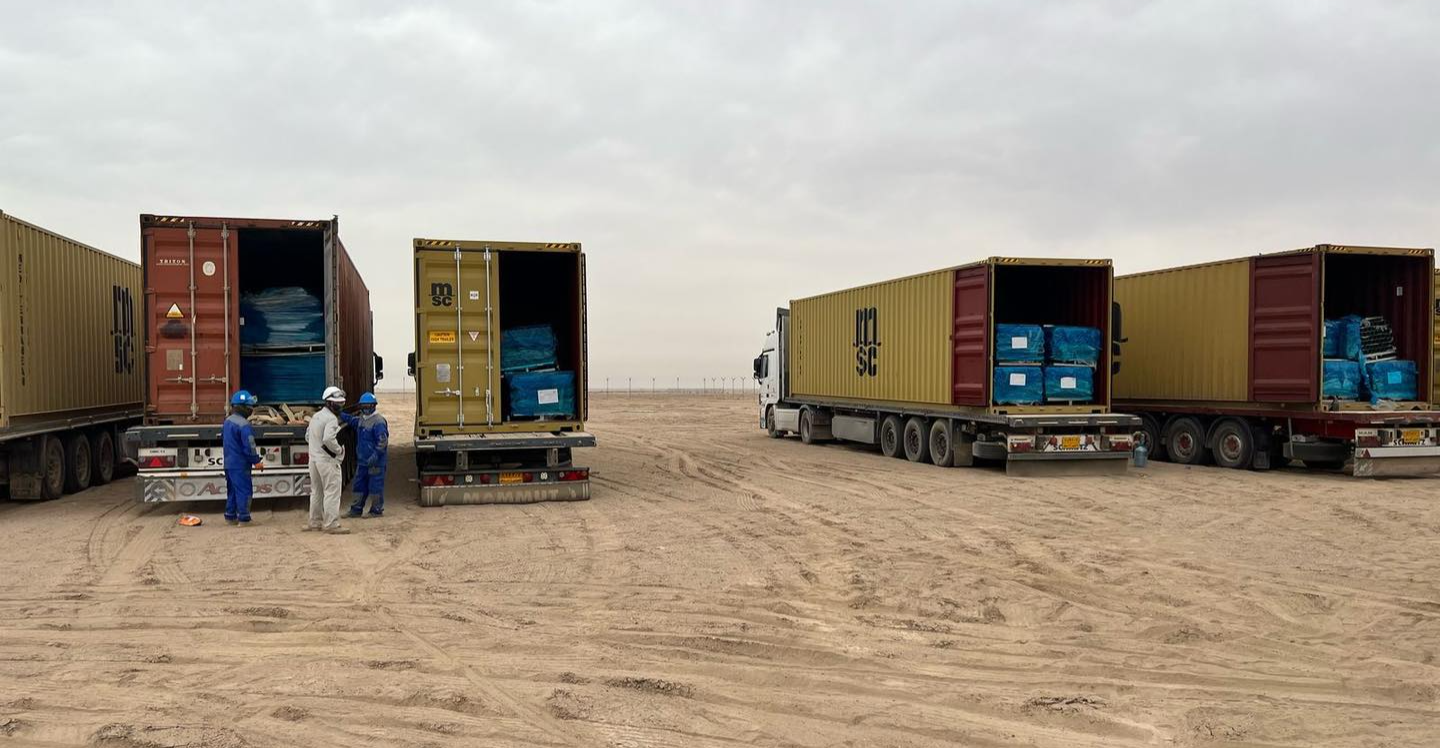 Iraqi Electricity Minister Ziyad Ali Fadhil announced on Thursday the arrival of more than 126,000 high-efficiency solar panels to the site of the “Shams Basra” solar energy project in the Artawi field, which is being implemented by the French company Total with a capacity of 1,000 megawatts.
Iraqi Electricity Minister Ziyad Ali Fadhil announced on Thursday the arrival of more than 126,000 high-efficiency solar panels to the site of the “Shams Basra” solar energy project in the Artawi field, which is being implemented by the French company Total with a capacity of 1,000 megawatts.
The minister said in a statement from his media office, received by Shafaq News Agency, that “the Shams Basra project is one of the largest renewable energy projects currently being implemented in Iraq, and it will contribute to meeting the growing demand for energy, especially during peak times.”
About 160 containers of imported solar panels from top global manufacturers arrived yesterday, in addition to 18 containers containing high- and medium-voltage cables needed for the electrical grid.
The minister explained, “Basra possesses the potential for diversifying its energy sources and electricity infrastructure, thanks to the efforts we have made over the past period, which have contributed to modernizing the province’s energy sector.”
According to the ministry, the “Shams Basra” project will provide clean energy to the electricity grid in Basra Governorate, enhance its stability, and open new horizons for investment in the renewable energy sector in Iraq.
Shafaq.com
The Iraqi dinar strengthens as the Baghdad and Kurdistan stock exchanges close.
The Iraqi dinar strengthens as the Baghdad and Kurdistan stock exchanges close.
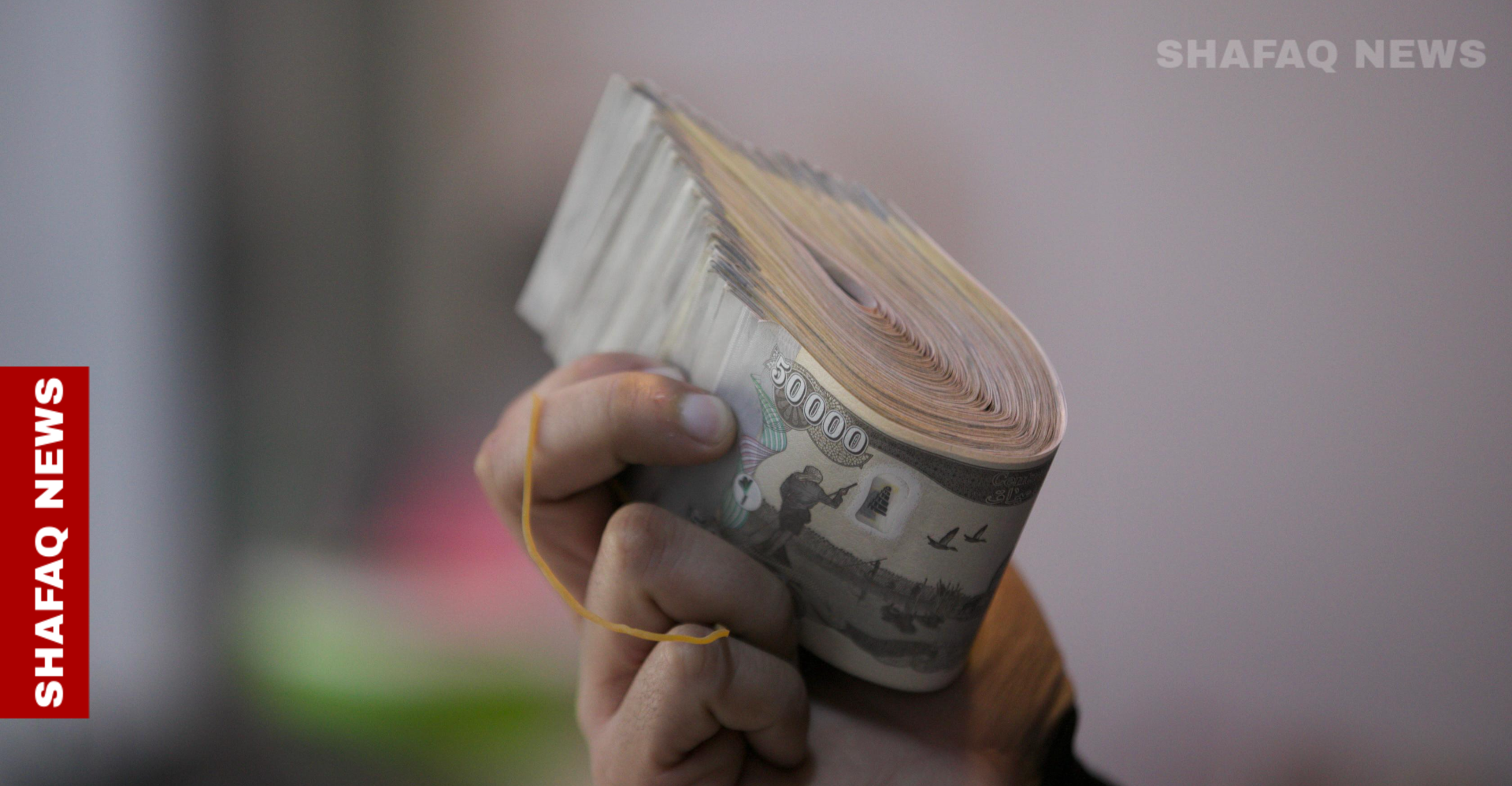 The markets of the Iraqi capital, Baghdad, and Erbil, the capital of the Kurdistan Region, witnessed a decline in the exchange rate of the US dollar against the Iraqi dinar with the closing of the stock exchange on Thursday evening.
The markets of the Iraqi capital, Baghdad, and Erbil, the capital of the Kurdistan Region, witnessed a decline in the exchange rate of the US dollar against the Iraqi dinar with the closing of the stock exchange on Thursday evening.
Shafaq News Agency correspondent reported that the dollar exchange rate fell on the Al-Kifah and Al-Harithiya stock exchanges in Baghdad, recording 144,600 dinars for every $100, after it was 145,200 dinars this morning.
Exchange rates also fell in Baghdad’s local markets, with the selling price reaching 145,500 dinars for $100, and the buying price reaching 143,500 dinars.
In Erbil, the capital of the Kurdistan Region, stock exchanges recorded a similar decline, with the selling price reaching 145,200 dinars per $100 and the buying price reaching 145,100 dinars per $100.
Shafaq.com
Ministry of Oil: New marine pipeline connects 3 strategic export ports
Ministry of Oil: New marine pipeline connects 3 strategic export ports
 The Ministry of Oil announced on Wednesday details of the third marine pipeline project, confirming that the project will enhance the export capacity of crude oil from the southern region, with a design capacity of 2 million and 400 thousand barrels per day, by linking three strategic outlets. The Director General of the Basra Oil Company, Basem Abdul Karim, told the official agency that “the third marine pipeline project for exporting oil is one of the strategic projects to which the government has attached great importance,” indicating that “the project will enhance export capacity from the south and contribute to increasing it significantly.”
The Ministry of Oil announced on Wednesday details of the third marine pipeline project, confirming that the project will enhance the export capacity of crude oil from the southern region, with a design capacity of 2 million and 400 thousand barrels per day, by linking three strategic outlets. The Director General of the Basra Oil Company, Basem Abdul Karim, told the official agency that “the third marine pipeline project for exporting oil is one of the strategic projects to which the government has attached great importance,” indicating that “the project will enhance export capacity from the south and contribute to increasing it significantly.”
He added, “The project consists of a 48-knot diameter offshore pipeline, extending 61 kilometers offshore and 9 kilometers onshore.” He noted that “the pipeline connects three offshore platforms: the first for valves near the Basra oil port, the second near the Khor al-Amaya port, in addition to an SPM-4 export platform.”
Abdul Karim also explained that “the project also includes vital support projects, including the marine terminal, which includes communications systems, electricity, and electrical control and communications systems.”
He explained that “a coalition of the Italian company Mycoperi and the Turkish company Ista was chosen to implement the project after a technical, commercial and financial evaluation of four companies applying, and under the supervision of the Japanese consultant accredited for the project.”
He pointed out that “the two companies submitted a comprehensive technical and commercial proposal for the construction of the pipeline and all its systems. The project was referred by the subcommittees of the Basra Oil Company, then through the central committee at the Ministry of Oil and the Ministerial Energy Committee, and finally to the Council of Ministers, which officially approved its transfer to the Italian-Turkish coalition.”
He also stressed that “the project connects three main ports: Basra Oil Port, Khor Al-Amaya Port, and the SPM-4 export platform, with a design capacity of approximately 2.4 million barrels per day.”
He concluded by saying, “The project will be implemented over a two-year period, while initial operations of the Basra section will begin within 8 to 9 months, a period included within the project’s full timeframe.”
Burathanews.com
Oman expresses its readiness to cooperate with Iraq in the fields of ports and airports.
Oman expresses its readiness to cooperate with Iraq in the fields of ports and airports.
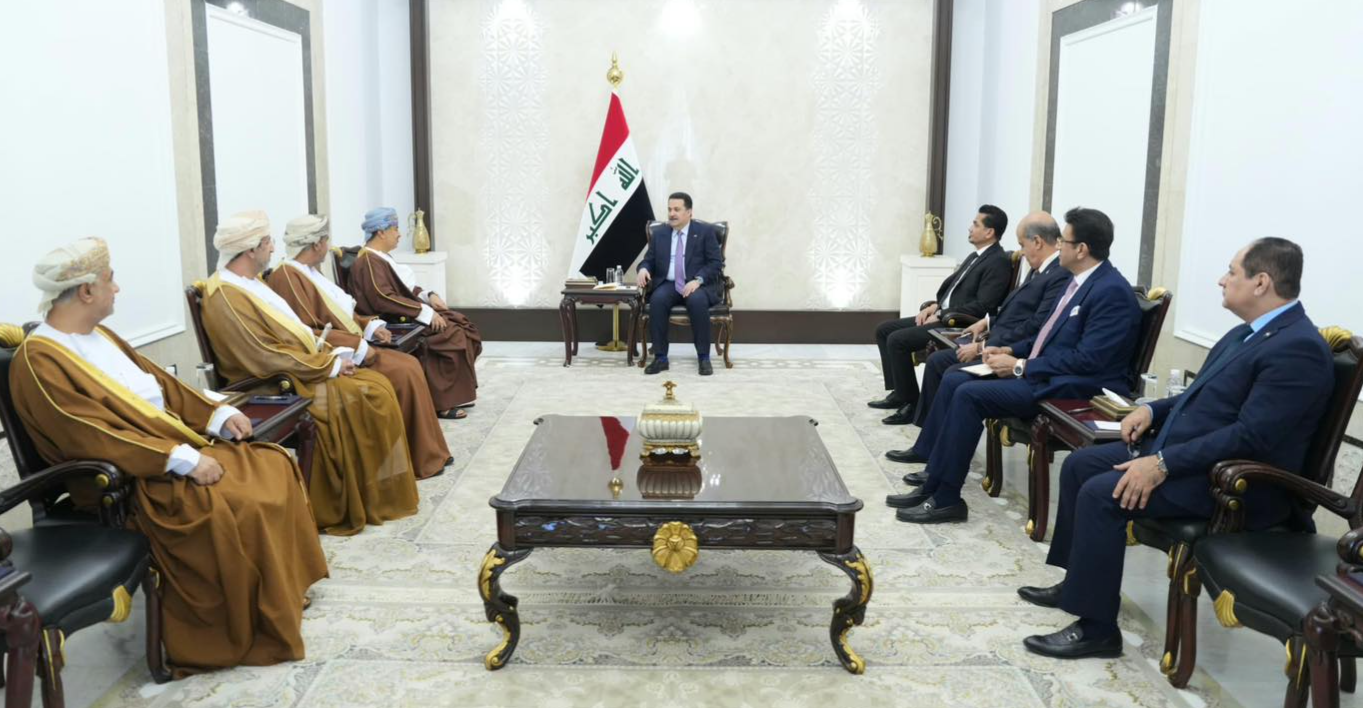 Shafaq News / Iraqi Prime Minister Mohammed Shia al-Sudani discussed on Thursday with the Omani Minister of Transport, Communications and Information Technology, Said bin Hamoud al-Maawali, developing cooperation in various fields. The latter expressed his country’s readiness to do so, especially in the ports and airports sectors.
Shafaq News / Iraqi Prime Minister Mohammed Shia al-Sudani discussed on Thursday with the Omani Minister of Transport, Communications and Information Technology, Said bin Hamoud al-Maawali, developing cooperation in various fields. The latter expressed his country’s readiness to do so, especially in the ports and airports sectors.
This came during Prime Minister Mohammed Shia al-Sudani’s reception of the Omani minister in Baghdad. Al-Sudani welcomed al-Maawali and extended his greetings to the Sultan of Oman.
Al-Sudani pointed out, according to a statement from his media office received by Shafaq News Agency, the progress and advancement of the development, labor, and investment sectors in Iraq, including the telecommunications sector, thanks to the political, security, and social stability and the economic renaissance witnessed by the country. He stressed that the many commonalities between Iraq and the Sultanate of Oman represent an opportunity to develop economic and investment cooperation between the two countries.
For his part, Al-Maawali commended Iraq’s achievements on various fronts and reviewed the results of his discussions in Baghdad, affirming the readiness of his country’s public and private sectors to cooperate with Iraq in the field of the digital economy and digital government. He also expressed his country’s willingness to cooperate in the ports and airports sectors by investing in projects related to various Iraqi airports.
Shafaq.com
